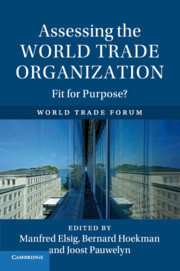Book contents
- Assessing the World Trade Organization: Fit for Purpose?
- Assessing the World Trade Organization
- Copyright page
- Contents
- Figures
- Tables
- Contributors
- Preface
- Abbreviations
- Part I Introduction and Setting the Stage
- Part II New Insight from the Early Times
- Part III General Trends and Patterns in WTO Dispute Settlement
- Part IV Zooming in on Specific Debates
- Part V Interactions Within and Across Regimes
- Index
- References
Part III - General Trends and Patterns in WTO Dispute Settlement
Published online by Cambridge University Press: 19 May 2017
- Assessing the World Trade Organization: Fit for Purpose?
- Assessing the World Trade Organization
- Copyright page
- Contents
- Figures
- Tables
- Contributors
- Preface
- Abbreviations
- Part I Introduction and Setting the Stage
- Part II New Insight from the Early Times
- Part III General Trends and Patterns in WTO Dispute Settlement
- Part IV Zooming in on Specific Debates
- Part V Interactions Within and Across Regimes
- Index
- References
- Type
- Chapter
- Information
- Assessing the World Trade OrganizationFit for Purpose?, pp. 97 - 200Publisher: Cambridge University PressPrint publication year: 2017



